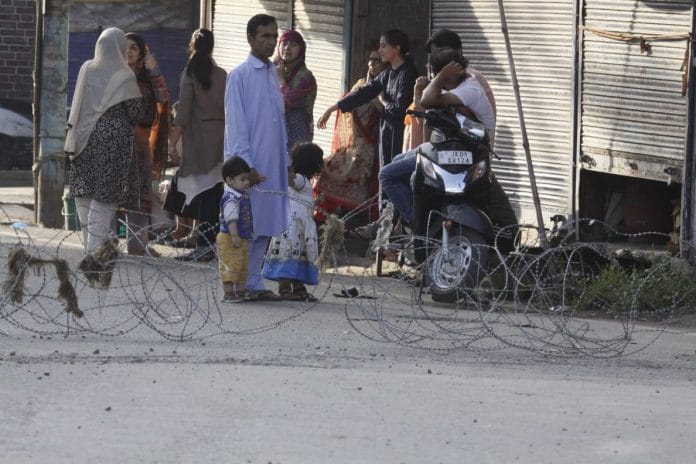Srinagar: The Narendra Modi government has sanctioned a total of Rs 2,000 crore until now this year for panchayats across Jammu & Kashmir and Ladakh, where local elections were held in 2018 after a gap of seven years.
While the schemes on which the allocated money will be spent are still being drafted, according to sources, the villages have already received instalments, with some panchayats finding as high as Rs 1 crore directly transferred to their accounts.
Officials say the direct transfer of the money aims to “empower the panchayats and sarpanchs” who were elected after “successful” conduct of panchayat elections in the state in nine phases from 17 November to 11 December last year.
After releasing Rs 800 crore in four installments between March and August 2019, ahead of the decision to bifurcate the state of Jammu and Kashmir into two union territories, the government last week sanctioned another Rs 1,200 crore.
Sheetal Nanda, Secretary, Rural Development and Panchayati Raj, Jammu and Kashmir, said the first installment has already reached the state administration while four more will follow. Her department will transfer the money directly to the sarpanchs this month.
A source in the J&K administration said several schemes are being drafted for utilisation of the allocated money.
First for J&K
Speaking to ThePrint, Nanda said this is the first time that the panchayats in Jammu and Kashmir have been allocated such high amounts for developmental work to be carried out in the villages.
“Even from 2011 to 2016 (combined), the panchayats did not receive the amount money that it has received after the 2018 elections,” she said.
The nine-phase panchayat elections held in 2018 recorded a 74 per cent voter turnout, and Nanda credited the fact to the amount sanctioned for the villages. Explaining this, she said it was well-publicised before the polls that money would now be transferred directly to the panchayats.
“People felt since the money will come directly to the panchayats, it will be used for the betterment of the villages, and that they should choose their sarpanch wisely. This ensured a good voter turnout,” Nanda said.
Also read: Kashmir teen dies, police claim he was hit by stones, doctors say shell injury caused death
Before November 2018, elections were last held across Jammu and Kashmir’s 4,483 panchayats in 2011. After the panchayats were dissolved in 2016, it took two years before fresh elections could be conducted.
Nanda said the amount transferred to the panchayats’ accounts remains at their disposal. The sarpanchs no longer have to go to the government every time they need to get money sanctioned.
“Once received by us, the entire money goes to the panchayats’ account directly and they decide what they do with it. This puts the entire responsibility on the sarpanch,” Nanda said.
“The distribution of money depends on the area and the population of the village. This time some of the villages have received as high as Rs 80 lakh to Rs 1 crore,” added the official.
Empowering the local leaders
A source in the J&K administration said the Modi government’s move, in addition to legislative changes from last year, came in a bid to “empower the sarpanches” and make them more accountable to the people who elect them and towards their villages.
In October last year, amendments were made to the Jammu and Kashmir Panchayati Raj Act, 1989, to include some schedules to make the sarpanches more powerful and the Panchayati Raj system more robust, Nanda said.
“After the amendments, the power to approve major development plans, programmes and projects for the village are now with the sarpanch,” she said.
The source said, “The planning process regarding schemes in the village and identification of beneficiaries is now be done by the panchayat.”
While sarpanch is the head of the panchayat in a village, the panchs are heads of wards in the village. A village has only one sarpanch but five to 11 panchs with him.
The source added that the J&K administration wrote to all the districts in January 2019 asking the sarpanches to designate the subjects that their panchs will look after.
“The panchs have now been given specific subjects to look after. These subjects range from education to sanitation to economic matters,” he said.
Also read: How Kashmir’s getting by — dark humour, scars of a missed Eid & apples sold for a pittance
Nanda said, “The social audits in respect to funds utilised under different schemes in the wards are now done by the panchayats who are asked to give us regular reports on the same.”
Further, the sarpanch has also been given the responsibility to mobilise voluntary labour and contribute in kind or cash, manage water bodies, forest, control local plans and resources.
Training
In January earlier this year, the authorities conducted a four-month “induction training” to train the sarpanchs for their new responsibilities.
“The sarpanchs were trained for four months for their new role. A 10-day digital training will also be given to them on how to work digitally, make digital payments, maintain records etc. These training sessions will be held regularly every two months,” Nanda said.
The J&K administration is also organising “exposure visits” for the panchayats to see other working models in villages across India.
“We had sent some sarpanchs to villages in Hyderabad. Given so many powers and responsibilities, it is essential for the sarpanchs to understand that they will now be a major part of the administration,” Nanda said.
“It is the first time that they have been given such responsibilities,” she added.
Also read: How foreign media has covered Kashmir crisis — and run foul of Modi govt






